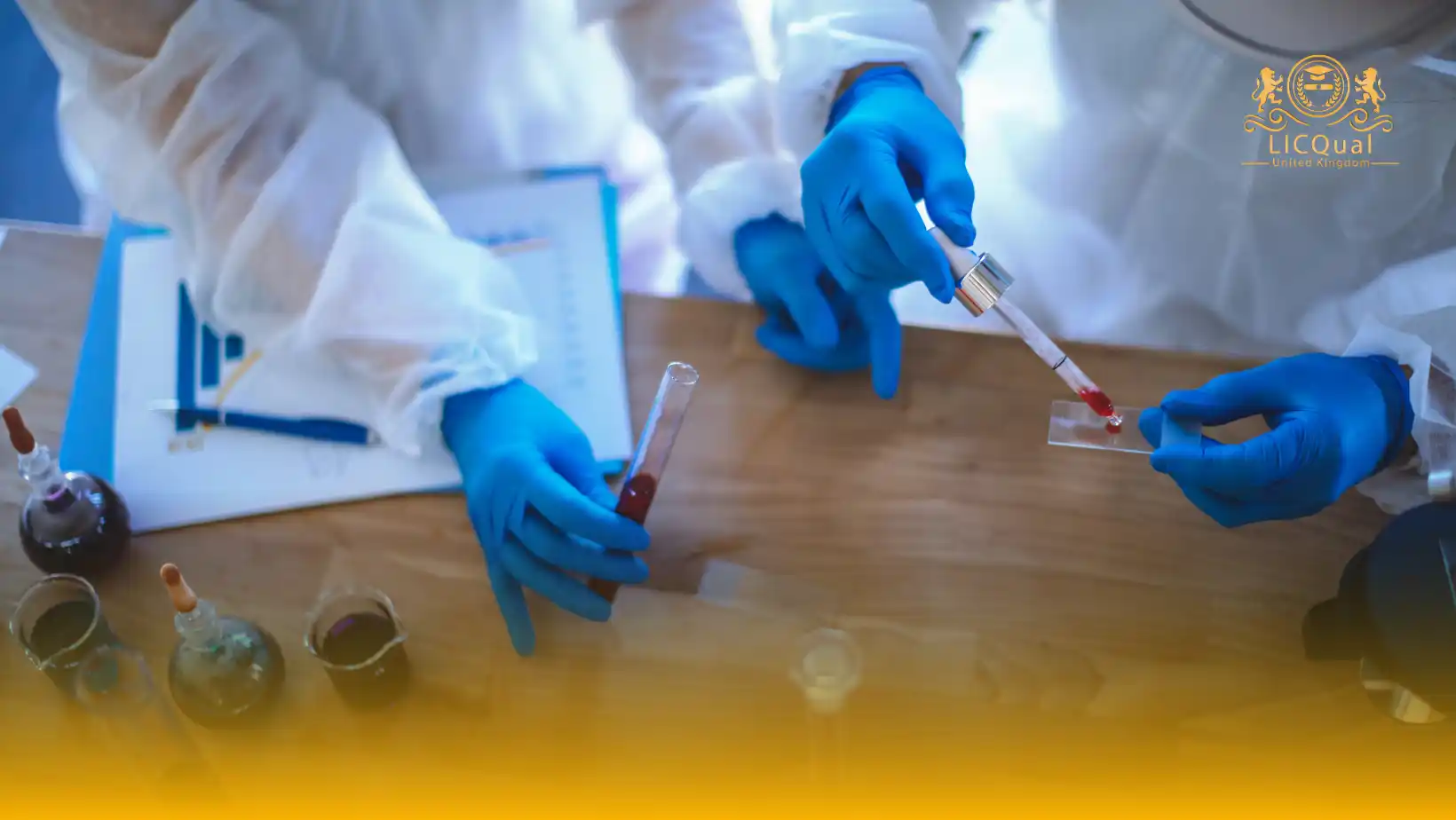The LICQual Level 6 Diploma in Infectious Diseases (Dip ID) is a specialised and advanced qualification designed for healthcare professionals who wish to expand their expertise and strengthen their career prospects in the ever-evolving field of infectious diseases. This diploma is not intended for fresh candidates but is aimed at experienced practitioners who are committed to advancing their professional knowledge, improving patient outcomes, and enhancing their Continuing Professional Development (CPD).
Infectious diseases continue to pose significant challenges to global health, requiring skilled professionals with the ability to diagnose, manage, and prevent outbreaks effectively. This diploma equips learners with in-depth knowledge of microbial infections, epidemiology, clinical management, infection control practices, and emerging global health threats. It is particularly suited for healthcare practitioners working in hospitals, public health, research, or specialist clinical environments who aspire to take on advanced roles or leadership positions.
Centres delivering this qualification must ensure that competent and qualified staff, supported by up-to-date facilities, simulation resources, and comprehensive learning materials, are in place to provide the highest standards of training. Access to the latest research, case studies, and evidence-based practices is essential to ensure learners receive relevant and high-quality education.
By completing the LICQual Level 6 Diploma in Infectious Diseases, learners not only broaden their academic and clinical knowledge but also strengthen their capacity to contribute to global health solutions. This qualification is an excellent opportunity for professionals seeking to progress in their careers while making a meaningful impact on healthcare systems worldwide.
Course Overview
Qualification Title
LICQual Level 6 Diploma in Infectious Diseases (Dip ID)
Total Units
6
Total Credits
120
GLH
480
Qualification #
LICQ2200920
Qualification Specification
To enroll in the LICQual Level 6 Diploma in Infectious Diseases (Dip ID), applicants must meet the following criteria:
|
Qualification# |
Unit Title |
Credits |
GLH |
|---|---|---|---|
|
LICQ2200920-1 |
Principles and Foundations of Infectious Diseases |
20 |
80 |
|
LICQ2200920-2 |
Microbiology, Pathogenesis, and Emerging Pathogens |
20 |
80 |
|
LICQ2200920-3 |
Epidemiology, Outbreak Investigation, and Global Health Threats |
20 |
80 |
|
LICQ2200920-4 |
Clinical Management of Infectious Diseases |
20 |
80 |
|
LICQ2200920-5 |
Infection Prevention, Control, and Antimicrobial Stewardship |
20 |
80 |
|
LICQ2200920-6 |
Research, Evidence-Based Practice, and CPD in Infectious Diseases |
20 |
80 |
By the end of this course, learners will be able to:
Unit 1: Principles and Foundations of Infectious Diseases
Learning Outcomes:
- Demonstrate advanced understanding of the basic principles, classifications, and history of infectious diseases.
- Analyse the mechanisms of disease transmission, host responses, and immunity.
- Evaluate the social, environmental, and economic impact of infectious diseases on healthcare systems.
- Apply fundamental concepts to real-world case studies in clinical and public health contexts.
Unit 2: Microbiology, Pathogenesis, and Emerging Pathogens
Learning Outcomes:
- Examine the microbiology of bacteria, viruses, fungi, and parasites relevant to human health.
- Analyse the pathogenesis of infectious agents and their interactions with host cells.
- Critically evaluate emerging and re-emerging pathogens, including antimicrobial-resistant organisms.
- Apply laboratory and diagnostic techniques to the identification of infectious diseases.
Unit 3: Epidemiology, Outbreak Investigation, and Global Health Threats
Learning Outcomes:
- Apply advanced epidemiological principles in the study of infectious disease patterns.
- Conduct outbreak investigations and interpret epidemiological data to guide interventions.
- Critically evaluate global health threats such as pandemics, zoonotic diseases, and bioterrorism.
- Assess the role of surveillance systems, policies, and international organisations in disease control.
Unit 4: Clinical Management of Infectious Diseases
Learning Outcomes:
- Demonstrate clinical competence in diagnosing and managing major infectious diseases (e.g., HIV, TB, malaria, influenza).
- Apply evidence-based treatment guidelines, including antimicrobial therapy and supportive care.
- Evaluate differential diagnoses and advanced diagnostic tools for complex cases.
- Develop patient management strategies that integrate ethical, cultural, and multidisciplinary perspectives.
Unit 5: Infection Prevention, Control, and Antimicrobial Stewardship
Learning Outcomes:
- Design and implement infection prevention and control strategies in healthcare and community settings.
- Critically evaluate the impact of antimicrobial resistance on public health.
- Apply principles of antimicrobial stewardship to promote responsible use of medicines.
- Assess infection control programmes and policies for effectiveness and sustainability.
Unit 6: Research, Evidence-Based Practice, and CPD in Infectious Diseases
Learning Outcomes:
- Critically analyse and interpret current research in infectious disease medicine and public health.
- Apply evidence-based practices to improve clinical outcomes and infection control.
- Design and conduct independent research projects relevant to infectious diseases.
- Demonstrate commitment to Continuing Professional Development (CPD) through reflective practice and lifelong learning.
The LICQual Level 6 Diploma in Infectious Diseases (Dip ID) is designed for healthcare professionals who want to specialize in the prevention, diagnosis, and management of infectious and communicable diseases. This internationally recognized qualification is ideal for doctors, nurses, and practitioners seeking advanced expertise in infection control, epidemiology, and global health. Whether you aim to progress in your current role, move into public health leadership, or strengthen your academic profile, this accredited infectious diseases diploma provides the skills, recognition, and credibility to achieve your career goals.
1. Medical Doctors and Physicians
- Gain advanced expertise in diagnosing and managing infectious diseases
- Strengthen clinical decision-making with evidence-based approaches
- Enhance professional credibility with a Level 6 infectious diseases diploma
- Expand opportunities in hospitals, clinics, and global health organizations
- Stay updated with the latest infection control guidelines and protocols
- Build a pathway toward postgraduate study or specialization
2. Nurses and Advanced Nurse Practitioners
- Develop specialized skills in infection prevention and patient care
- Improve confidence in managing communicable diseases in clinical settings
- Earn an accredited infectious diseases diploma recognized internationally
- Support multidisciplinary teams with advanced infection control knowledge
- Increase career opportunities in hospitals, community health, and public health units
- Deliver better patient outcomes through structured training
3. Public Health and Epidemiology Professionals
- Strengthen expertise in outbreak management and disease surveillance
- Gain structured training in epidemiology and infection control strategies
- Enhance credibility with an internationally recognized qualification
- Contribute to vaccination programs and public health initiatives
- Improve community health outcomes through evidence-based practice
- Expand career opportunities in government and global health agencies
4. Laboratory and Microbiology Specialists
- Advance skills in microbiology, virology, and immunology
- Gain deeper knowledge of diagnostic testing and laboratory safety
- Support clinical teams with accurate infectious disease diagnostics
- Enhance career progression in research and laboratory sciences
- Contribute to antimicrobial resistance monitoring and control
- Build credibility with a globally recognized diploma
5. International Medical Graduates
- Obtain a qualification recognized in the UK, Middle East, and Asia
- Strengthen professional profiles for global healthcare careers
- Meet international accreditation and healthcare standards
- Gain credibility for advanced clinical and public health roles abroad
- Access flexible online study while working internationally
- Build a competitive edge in global healthcare markets
6. Professionals Seeking Private Practice Opportunities
- Acquire specialized infectious disease skills for independent practice
- Increase patient demand with accredited qualifications
- Offer advanced infection control and treatment services in private clinics
- Build a reputation as a trusted infectious disease practitioner
- Expand earning potential through specialized expertise
- Position yourself as a leader in communicable disease care
7. Academic and Research Professionals
- Strengthen academic credentials with a Level 6 infectious diseases diploma
- Contribute to infectious disease research and publications
- Gain structured knowledge aligned with global standards
- Support teaching roles in medical and healthcare education
- Enhance credibility in academic and professional networks
- Build a pathway toward higher-level qualifications and research
Centres wishing to deliver the LICQual Level 6 Diploma in Infectious Diseases (Dip ID) must meet strict quality standards to ensure effective teaching, professional delivery, and successful learner outcomes. To be approved, centres must provide the following:
- Qualified and Experienced Staff: Centres must employ trainers, tutors, and assessors with relevant qualifications and professional experience in infectious diseases, microbiology, epidemiology, and clinical practice.
- Appropriate Learning Facilities: Delivery must take place in well-equipped classrooms, laboratories, or simulation environments that reflect real-world healthcare and public health settings.
- Comprehensive Learning Materials: Centres are required to provide learners with access to updated textbooks, case studies, digital libraries, and evidence-based medical resources.
- Strong Assessment and Quality Assurance Systems: Centres must have robust mechanisms in place for fair, transparent, and reliable assessments, supported by internal and external quality assurance processes.
- Digital and Technological Resources: Learners should have access to online platforms, research databases, and e-learning tools to support flexible and blended learning.
- Learner Support Services: Academic and pastoral support must be provided, ensuring learners can successfully progress through the qualification.
- Commitment to CPD and International Standards: Centres must demonstrate ongoing investment in staff development, continuous improvement, and alignment with global standards in healthcare education.
By meeting these requirements, centres will be able to deliver a world-class qualification in infectious diseases, enabling learners to gain the advanced knowledge, practical skills, and research expertise necessary to contribute to global health solutions.
Assessment and Verification
All units within this qualification are subject to internal assessment by the approved centre and external verification by LICQual. The qualification follows a criterion-referenced assessment approach, ensuring that learners meet all specified learning outcomes.
To achieve a ‘Pass’ in any unit, learners must provide valid, sufficient, and authentic evidence demonstrating their attainment of all learning outcomes and compliance with the prescribed assessment criteria. The Assessor is responsible for evaluating the evidence and determining whether the learner has successfully met the required standards.
Assessors must maintain a clear and comprehensive audit trail, documenting the basis for their assessment decisions to ensure transparency, consistency, and compliance with quality assurance requirements.







